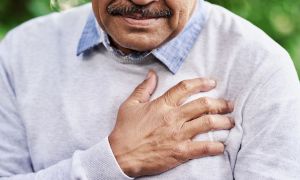Heart attacks happen when arteries become narrowed by a fatty substance called plaque that builds up on the walls of the artery. As plaque weakens over time, blood clots can develop in the artery that can then prevent blood from flowing freely in the heart arteries that supply blood to the heart muscle. Heart attacks can be dramatic events that strike with little warning and the kind of chest-clutching pain depicted in movies. Or a heart attack can be "silent" - occurring over time with symptoms the patient does not recognize and diagnosis accomplished only when a doctor does a routine EKG (electrocardiogram). Somewhere in between these two extremes are heart attacks that "stutter."
A "stuttering heart attack" occurs when an artery that supplies blood to the heart becomes very unstable. On the one hand, the artery is fully clogged with plaque and blood cannot get through to deliver much-needed oxygen to the heart. But, on the other hand, the plaque periodically gives way, opening the channel a bit to allow some blood to pass through to the heart. As the heart is receiving the oxygenated blood in an "off and on" fashion, so too does the patient experience symptoms that flare up and then subside. Because the symptoms come and go, patients and even healthcare providers may misinterpret the symptoms as indigestion or other conditions that might mimic heart-related illness. This is unfortunate because stuttering heart attacks can actually be more serious than other, more acute heart attacks. This is because both patients and healthcare providers may delay treatment, and those delays lead to greater heart damage. To minimize heart damage, the unstable artery must be treated and blood flow restored.
A stuttering heart attack is much like the smoldering embers of a fire. The affected artery could stay quiet for some time, throwing off a few sparks here and there, or it could burst into catastrophic flames. In this analogy, the quiet smolder could gradually cause irreversible heart damage potentially resulting in heart failure, whereas the flames could be a fatal heart attack or a dangerously irregular heartbeat (called an arrhythmia) that could lead to sudden cardiac arrest.
Continue Learning about Heart Attack
Important: This content reflects information from various individuals and organizations and may offer alternative or opposing points of view. It should not be used for medical advice, diagnosis or treatment. As always, you should consult with your healthcare provider about your specific health needs.









